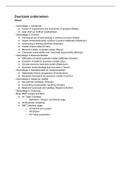Samenvatting
Duurzaam Ondernemen samenvatting 100%: Hoorcolleges + Artikelen + BMT
- Instelling
- Radboud Universiteit Nijmegen (RU)
- Boek
- Duurzaam organiseren
Samenvatting van Duurzaam Ondernemen, bevat: - Hoorcolleges: inclusief gastcollege en guiding questions - Artikelen: 17 Artikelen nodig voor het tentamen - BMT (Jonker & Faber): H1 en H2 + Definition Stage (H3 t/m H5)
[Meer zien]





